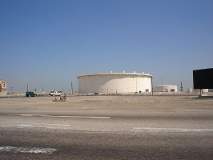
Sitra is the largest refinery in the island of Sitra, which is located south of Manama, the capital city of Bahrain. It is also known as Bahrain refinery and produces about 260,000 barrels per day (bpd) of crude oil and 40,000bpd of low sulphur diesel.
The refinery is established and developed by the Barhain Petroleum Company (BAPCO), which is a Bahrain Government-owned national oil company.
The feasibility study for the Sitra Refinert expansion was completed in June 2012. Ground-breaking ceremony of the capacity expansion project took place in January 2019, while the foundation stone was laid in March 2019.
Total estimated investment on the expansion is expected to be about $6.5bn. The expansion is slated for completion by 2022.
The project will generate 1,500 new jobs, including 150 permanent highly-skilled jobs.
Sitra refinery history
Sitra refinery was constructed in 1936 with an initial production capacity of approximately 10,000 barrels per day. The Bahrain Government retained 100% ownership of the refinery by establishing the Barhain Petroleum Company (BAPCO) in 1999.
The refinery imports about 85% of the crude oil from Saudi Arabia. It is connected by a 54km pipeline to Saudi Arabia for pumping the feedstock. BAPCO sells 8% of the production from the refinery to the domestic market in Bahrain and exports the remaining 92% to India, the Middle East, Far East and other South East Asian countries, as well as Africa.
The refinery has a marine storage terminal with a capacity of about 14 million barrels of natural gas and refined products. BAPCO supplies natural gas to power generation facilities and other industries.
BAPCO completed a turnaround at the refinery in April 2011 by putting a low sulphur diesel plant (LSDP) on stream. It included carrying out inspection and repairs to more than 320 pieces of equipment such as reactors, columns, heat exchangers and furnaces.
Sitra refinery expansion details
Feasibility studies on the refinery expansion project were completed in June 2012. The tenders for the front end engineering and design (FEED) for the expansion of the refinery were awarded in September 2014.
The FEED for the refinery expansion took into consideration the existing equipment, process accesses and other factors before designing the new part of the facilities.
The expansion will increase the crude oil refining capacity to 360,000 barrels per day from the existing 267,000 barrels per day. It will also include the construction of a hydrocracking unit with 60,000 barrels per day, expansion of the existing mild hydrocracking unit capacity from 54,000 barrels per day to 70,000 barrels per day, and replacing the fluid catalytic cracker (FCC) unit.
The project will have a unit for hydro desulphurisation, crude distillation, vacuum distillation, hydrogen production and recovery, and a saturated gas plant.
Units for sulphur recovery, tail gas treatment, sour water stripping, amine recovery, bulk acid gas removal, sulphur solidification will also be added under the expansion project.
The expansion will include establishing petrochemical units for producing olefins and achieving a sulphur reduction in the diesel product down to 10ppm.
BAPCO plans to construct a 70km pipeline to connect Ras Tanura refinery in Saudi Arabia to Sitra.
Technology for the refinery expansion at Sitra
The Sitra refinery will be installed with GE ZeeWeed ultrafiltration and biological treatment technology for the wastewater treatment plant located at the refinery.
BAPCO is expected to appoint an adviser for the selection of technology for the refinery expansion by mid-2013.
Contractors involved with the expansion of Sitra refinery
Related project
Luberef II Yanbu Refinery Expansion, Saudi Arabia
Luberef Yanbu Refinery is the largest crude oil refinery in the world. It is located on the Red Sea at Yanbu, near the city of Dhahran in Saudi Arabia.
BAPCO awarded a contract to GS Engineering & Construction in June 2012 for designing and supplying a membrane bioreactor (MBR) system for the waste water treatment plant. The scope of the contract includes providing four MBR trains, which can handle about 24 million litres of waste water per day.
BAPCO selected HSBC and BNP Paribas as the financial advisers for the refinery expansion in January 2013.
The FEED study was carried out by TechnipFMC.
BAPCO awarded the $4.2bn engineering procurement construction and commissioning (EPCC) contract to TechnipFMC, Samsung Engineering and Tecincas Reunidas in December 2017.




